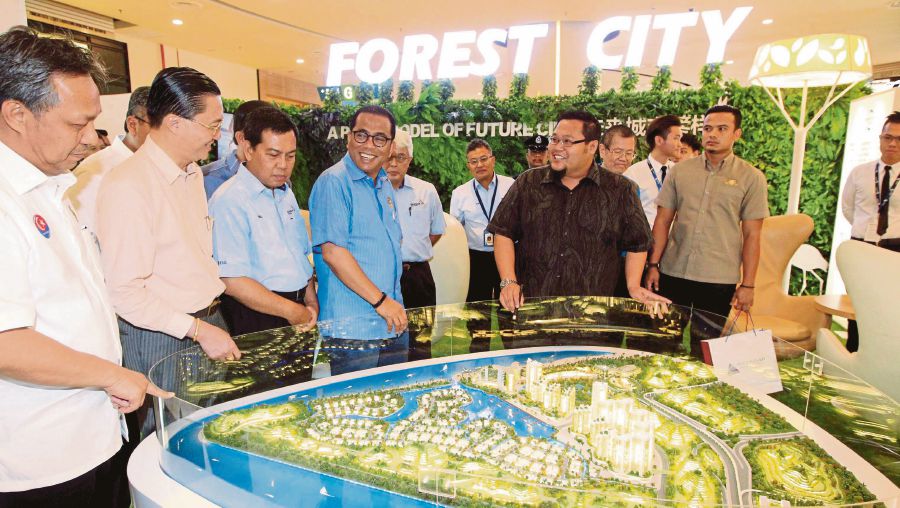It’s been an exciting 11 years since the launch of Iskandar Malaysia. We have achieved many milestones.
To date, more than 700,000 employment opportunities have been created in the southern Johor region.
This exceptional achievement goes in line with Goal 8 of the United Nations Sustainable Development Goals of promoting productive employment and decent work for all.
I want to highlight a testimony of a fisherwoman from the Kong Kong coastal village near Masai in Iskandar Malaysia.
She said and I quote: “Without Iskandar Malaysia’s social inclusiveness programme, I would still be a mere fisherwoman, depending on the sea for my livelihood. Today, I am a fisherwoman, businesswoman and tour guide all lumped into one. I have never been happier. My income has increased by more than 50 per cent!
“Money aside, I learnt so many invaluable lessons and our eyes are opened to opportunities. We are also trained to think out of the box, and to innovate our basic skills and strengths into something even bigger and better.”
This goes to show we can propel every individual in the community to fulfil his or her greatest potential with the right initiatives.
Milestones like this are what we treasure, where personal capacities are empowered and tangible progress is experienced by every member of society.
A second milestone is the progress made by EduCity Iskandar Malaysia in achieving its goal of becoming a world-class education hub.
The first of its kind in Asia, it has raised the profile of Johor as a destination for educational tourism, and gives opportunities to Malaysians to pursue international tertiary education at a lower cost.
With seven international university campuses and two international schools, EduCity is a feeder of talent to support Iskandar Malaysia’s economic activities while grooming future generations of leaders.
Another milestone is the progress of Smart City Iskandar Malaysia, which employs widespread and innovative use of information and communication technology for sustainable living.
This translates into six dimensions — Smart Economy, Smart Governance, Smart Environment, Smart Mobility, Smart Living and Smart People.
I am proud to announce that until last year, almost 50 per cent of the 80 Smart City projects were completed.
These projects were carried out with the people as their focus. They enrich, empower and enhance the lifestyle of Johoreans, Malaysians and global citizens who choose to make Johor their home.
The most significant milestone is the launch of the Low Carbon Society Blueprint for Iskandar Malaysia 2025, which places sustainability at the heart of action.
The blueprint is one of the research outputs under the Science and Research Partnership for Sustainable Development project under the title “Development of Low Carbon Scenarios for Asian Region”.
The initiative is funded by Japan International Cooperation Agency and Japan Science and Technology Agency with strong support from Japan’s Environment Ministry. Universiti Teknologi Malaysia (UTM), Kyoto University, National Institute for Environmental Studies and Okayama University are also involved in the blueprint.
As the world works towards implementing the Paris Agreement on climate change and the 2030 agenda, Iskandar Malaysia took the initiative to address carbon emissions through this blueprint.
This blueprint outlines 281 implementation programmes which will reduce Iskandar Malaysia’s carbon intensity by 58 per cent by 2025.
The Low Carbon Society initiative has led to recognitions and spin-offs both nationally and internationally since the 18th Conference of the Parties to the UN Framework Convention on Climate Change in Doha, Qatar, in 2012.
The first recognition was the setting up of the UTM Asian Centre for Low Carbon Society in October 2013. The second was the recognition given to Iskandar Malaysia to be one of 10 cities and regions under UN’s Sustainable Energy for All project in September 2014.
In February 2015, the region hosted the Future City International Forum, which was the first outside Japan and was attended by over 250 participants. Japan chose Iskandar Malaysia in recognition of its internationally-known low carbon society project.
A signing of a letter of understanding between Toyama City, Japan, and the Iskandar Regional Development Authority in February 2015 was held on potential business ventures, notably on transportation, pharmaceuticals, mini-hydro initiatives and agricultural products.
Several other achievements led to an initiative to prepare a Low Carbon Society Blueprint for Malaysia and Low Carbon Society Blueprint for Kuala Lumpur.
Indeed, Iskandar Malaysia leads the way in this sector and is becoming a model for other states in Malaysia and the region.
We are going the extra mile in this with the Low Carbon Society Action Plans 2025 for five Johor local authorities.
The state government has also completed the Johor Sustainability Policy 2017-2021. The policy’s goal is to conserve and protect our natural heritage, control pollution and boost low-carbon growth for the wellbeing of all the people in Johor.
I truly believe that Johor and Iskandar Malaysia will continue to prosper in terms of economy, while the environment and the green agenda will become even more prominent in the years to come.
Indeed, balanced communities, liveable residences, conducive workplaces and a relaxing environment are what we want for ourselves, our children and our children’s children.
Source: New Straits Times | 31 July 2017














